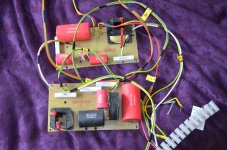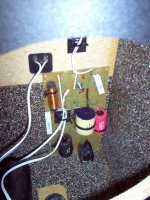Yes you can, but if you have a good amplifier that may work at low level with the voltage divider and line out...depends on your configuration. And how your basic electronics is
I've ordered the calibrated mic that you suggested. I've got a SoundBlaster Audigy Pro soundcard so that should be OK.
I'm confused are we using the soundcard for both source and for measuring ?
You use the soundcard for output source (DAC) and mic (if USB) for input. If analog mic then soundcard is the input ADC. Did you get the UMM-6 or the UMIK?
Also, not to throw a spanner in the works but if the schematics i have for the 683's are right there's a massive upgrade to be made on the mid & tweeter anyway...
The 683's are impressive as stock.
Anyway, I'm progressing down the active route. My Quad 909 clone has an issue with one channel oscillating. I've just bought a genuine Quad 606 for £300 which will be the woofer amp. The Pass Aleph 4 will be the mid range amp and I'm still playing with the tweeter amp, poss will be the Burmeister 933 mk2.
Anyway, I'm progressing down the active route. My Quad 909 clone has an issue with one channel oscillating. I've just bought a genuine Quad 606 for £300 which will be the woofer amp. The Pass Aleph 4 will be the mid range amp and I'm still playing with the tweeter amp, poss will be the Burmeister 933 mk2.
Attachments
I've used those Wilmslow PCBs, and I had some problems with them.
I initially placed some coils flat on the PCB, and the circuit didn't sound right. Seemed to ring.
I did some tests and found coils interact very badly with nearby ground planes as well as each other. Capacitors and resistors are no problem. The test was on a 1mH coil. I think you'll agree that a 20% change in inductance says that something bad is going on.
No easy answer to that. Except wooden crossovers. 😕
I initially placed some coils flat on the PCB, and the circuit didn't sound right. Seemed to ring.
I did some tests and found coils interact very badly with nearby ground planes as well as each other. Capacitors and resistors are no problem. The test was on a 1mH coil. I think you'll agree that a 20% change in inductance says that something bad is going on.
No easy answer to that. Except wooden crossovers. 😕
Attachments
I must say that I'm not impressed with the build quality of the Xovers anyway so rebuilding them onto a piece of hardboard is definitely an option to consider.
Yes, it could be dissapointing and misleading at the same time.
Checking acoustically would clear things up. While awaiting
for the mic to arrive, you might measure FR of your sound card
connecting line OUT and line IN with an appropriate piece of
cable (3,5 mm stereo jack on both ends probably) and HOLM.
Checking acoustically would clear things up. While awaiting
for the mic to arrive, you might measure FR of your sound card
connecting line OUT and line IN with an appropriate piece of
cable (3,5 mm stereo jack on both ends probably) and HOLM.
You don't want XO PCB's to have ground planes. If you don't have a minimal fiberglass PCB without a ground plane, better to use wood, foam core board, cardboard or even free space dead bug.
not to be throwing more fuel on an already bright fire, but I've never been too impressed with those wilmslow capacitors... I tried opening one once to see who they were made by but there were no clues.
Sound wise I find them rather dull, even compared to solen's caps, which are pretty mid-field anyway.
Add on to that the PCB problems and poor XO design and you've pretty much got scrap... but still, nothing proven until you re-build them and try them in stereo for a while.
This all reminds me of when I first really got into crossover design, someone on this forum made a comment along the lines of "90% of a speakers sound is defined by the crossover"... I think I'd agree with that and almost put it up from that now, the crossover has the ability to define a loudspeakers characteristics in so many ways that it is absolutely essential to get right, and even though there are argueably many 'right' configurations for a given design, the one you have still seem completely off.. it'll be interesting to see the results of some measurmenets.
How are you getting on with getting ready to take measurements? Have you read the appropriate guides and are you feeling ready and confident to do so?
It can be a bit daunting/difficult at first, but it's a rewarding process and will really help you understand what's going on with your speakers and why they sound how they do.. however that is.
Sound wise I find them rather dull, even compared to solen's caps, which are pretty mid-field anyway.
Add on to that the PCB problems and poor XO design and you've pretty much got scrap... but still, nothing proven until you re-build them and try them in stereo for a while.
This all reminds me of when I first really got into crossover design, someone on this forum made a comment along the lines of "90% of a speakers sound is defined by the crossover"... I think I'd agree with that and almost put it up from that now, the crossover has the ability to define a loudspeakers characteristics in so many ways that it is absolutely essential to get right, and even though there are argueably many 'right' configurations for a given design, the one you have still seem completely off.. it'll be interesting to see the results of some measurmenets.
How are you getting on with getting ready to take measurements? Have you read the appropriate guides and are you feeling ready and confident to do so?
It can be a bit daunting/difficult at first, but it's a rewarding process and will really help you understand what's going on with your speakers and why they sound how they do.. however that is.
I think you are right about XO design. It is a complex and difficult art to master and one solution is to go with active DSP XO's and bi/tri-amping. With miniDSP and low cost but great sounding class D TPA3116D2 amps, this path has enabled me to enjoy building multi way speakers and not get stuck at the newbie level with XO design - which would be my limiting factor. The flexibility with being able to dial in any slope at any frequency and pick LR vs BW or even add delay for time alignment on the fly is really a whole paradigm shift. Passive XO's when done right make the speaker. When done badly ruin it. At least with DSP and active XO's you have the ability to adjust and improve without buying more and more components. In the end it costs less than passives, IMO.
You may want to give it a try. I built a 2x4 50watt/ch active system with a miniDSP and two amps for $150.
You may want to give it a try. I built a 2x4 50watt/ch active system with a miniDSP and two amps for $150.
Have you by any chance documented this project? Any chance you could give more details? Preferably in a "NEW" thread 😉<snip>
I built a 2x4 50watt/ch active system with a miniDSP and two amps for $150.
Have you by any chance documented this project? Any chance you could give more details? Preferably in a "NEW" thread 😉
More details here: http://www.diyaudio.com/forums/full-range/247598-nautaloss-ref-monitor-44.html#post3864261
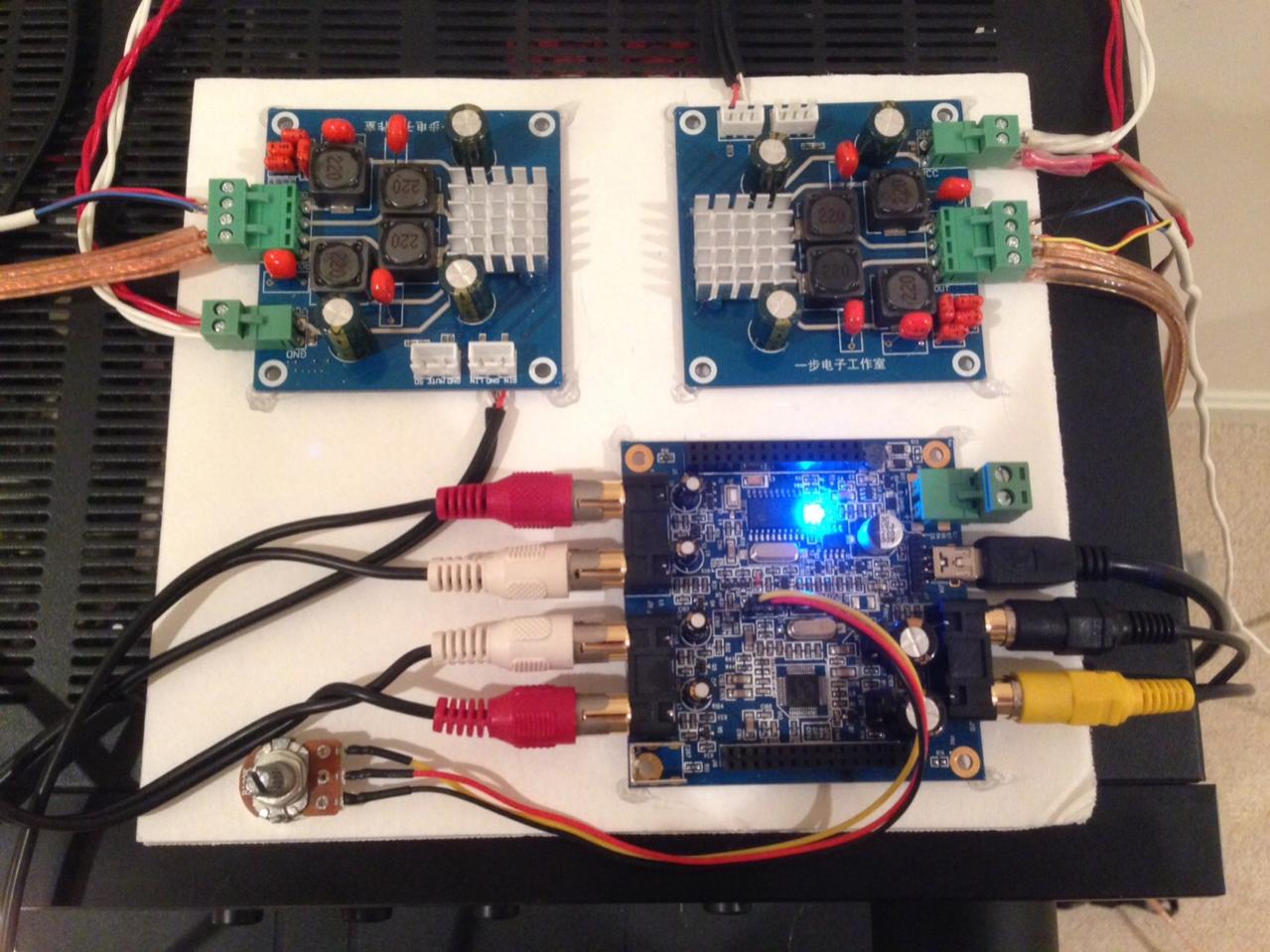
The amp can be bought here ($14 ea x qnty 2 is $28 total): Online Shop Free Shipping! 1pc TPA3116 Class D digital amplifier 50W +50 W with Silent Sleep Design|Aliexpress Mobile
MinDSP 2x4 is $80, 2x4 advanced XO and EQ plugin $10, volume pot $2, Shipping $25. $117 total.
$145 grand total. You probably have an old 19v laptop brick power supply already. Works great for amp. If not add $5ea x 2. http://www.amazon.com/dp/B005J963W6/ref=pe_385040_121528360_TE_dp_1
This is sort of what you can do with a system like this, here is an example of it used as a XO and amp for a full range tractrix synergy horn:
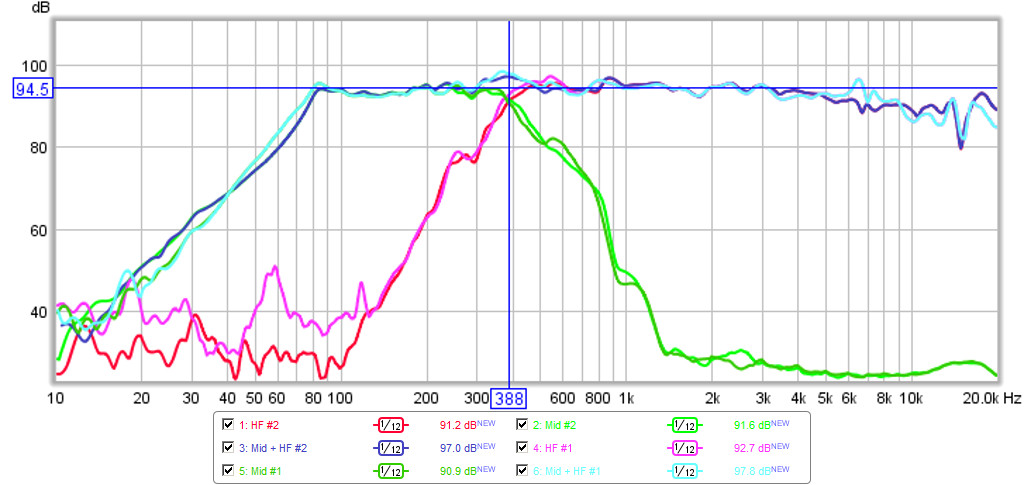
And from earlier post in this thread, same 2x4 can be configured as 1x4 four way for results like this 3-way tractrix synergy (Trynergy) with a sub woofer:
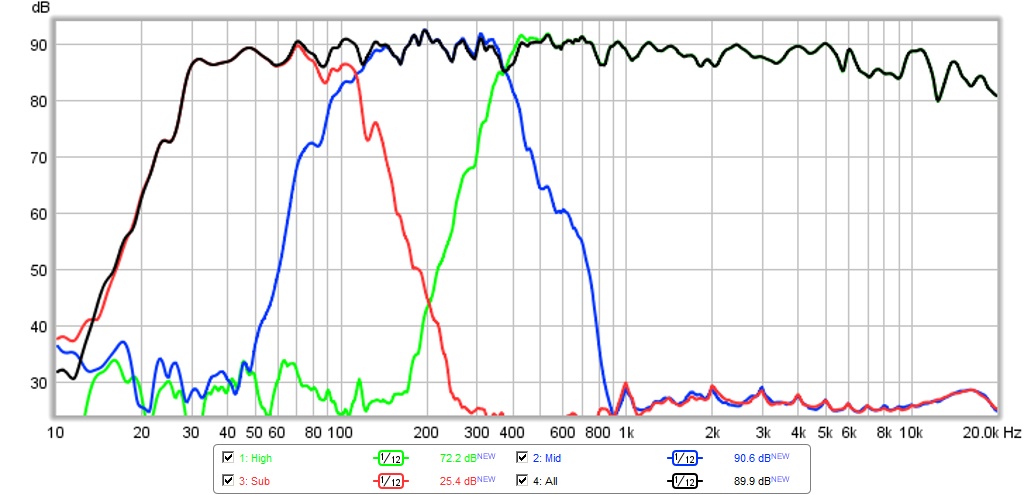
More info on Trynergy here: http://www.diyaudio.com/forums/full-range/261427-presenting-trynergy-full-range-tractrix-synergy.html
If there are still more questions I will start a new thread. Sorry for the OT digression.
Last edited:
not to be throwing more fuel on an already bright fire, but I've never been too impressed with those wilmslow capacitors... I tried opening one once to see who they were made by but there were no clues.
Sound wise I find them rather dull, even compared to solen's caps, which are pretty mid-field anyway.
Add on to that the PCB problems and poor XO design and you've pretty much got scrap... but still, nothing proven until you re-build them and try them in stereo for a while.
This all reminds me of when I first really got into crossover design, someone on this forum made a comment along the lines of "90% of a speakers sound is defined by the crossover"... I think I'd agree with that and almost put it up from that now, the crossover has the ability to define a loudspeakers characteristics in so many ways that it is absolutely essential to get right, and even though there are argueably many 'right' configurations for a given design, the one you have still seem completely off.. it'll be interesting to see the results of some measurmenets.
How are you getting on with getting ready to take measurements? Have you read the appropriate guides and are you feeling ready and confident to do so?
The calibrated mic is coming form USA so might take a while. I'll be interested to see the results.
- Status
- Not open for further replies.
- Home
- Loudspeakers
- Multi-Way
- Wilmslow Audio - Prestige platinum
